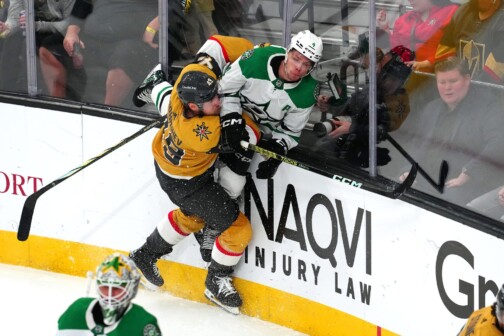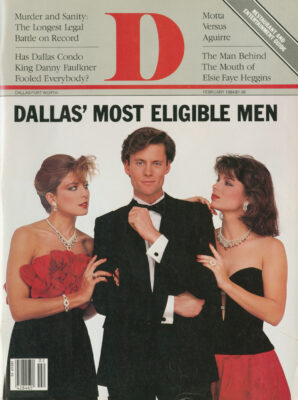IF YOU THINK the only thing that makes a chef mad is a fallen soufflé, think again. Try restaurant reviews. Now that’s a hot topic. We found out how hot recently, when we hosted a luncheon attended by several of Dallas’ finest chefs. We discovered that restaurant criticism is as delicately balanced as a temperamental hollandaise sauce-the pronouncements of which can make or break, offend or elate. Criticism is sometimes fair, but, according to these chefs, is often not. A meal, to this panel, is more than breakfast, lunch or dinner. It’s an experience to be savored, lingered over and fondly remembered.
Criticism is the staff of life to another set of professionals as well: the restaurant reviewers charged with making such gastronomic pronouncements. It is they who eat, write and send their readers either enthusiastically to, or away from, restaurants.
But often-too often-chefs and restaurant reviewers disagree about criticism-the amount and the validity of such: “There was too much honey in the sauce,” writes one reviewer. “There is no honey in the sauce,” steams the chef. And so on and so on. For too long, there had been no forum for chefs and food critics to meet and debate. Thus was born D’s Chefs Luncheon, in which gladiators from each camp-armed with note pads and saucepans-met on the culinary battlefield to discuss (loudly and sometimes in unison) the merits and demerits of food and restaurant criticism. The site was the elegantly appointed Lashio Room at the new Mandalay Four Seasons Hotel in Las Colinas. Our hosts were Mandalay Four Seasons general director Dennis Mills and food and beverage director Greg Miller.
On one end of the long table presided Michael Carlton, a well-known restaurant reviewer from The Denver Post. Carlton moved to The Post after seven years as a restaurant reviewer for the Dallas Times Herald. In addition, in his duties as travel editor, he has dined in restaurants all over the world. Carlton was joined by D Publisher Terry Murphy and Editor Lee Cul-lum, who evaluate the performance of our restaurant critics. D Sections Editor Teena Gritch moderated the discussion.
On the chefs’ side, the lineup consisted of Jean Claude Prevot, owner/proprietor of Jean Claude’s; Guy Calluaud, owner/proprietor of Calluaud’s; Rene Weibel, the executive chef of the Mandalay Four Seasons; Michel Pieton, the head chef of Enjolie in the Mandalay Four Seasons (Weibel and Pieton prepared the luncheon); Klaus Mit-telhauser, executive chef of the Fairmont Hotel’s Pyramid Room; Didier Calvez, food and beverage director of Blom’s in the Westin Hotel; Peter Schaffrath, executive chef at Café Royal in Plaza of the Americas; and Gerard Bahon, executive chef of The Adolphus Hotel’s French Room.
After a champagne toast to all, the debate was on:
Carlton: The one thing you all should realize is that our editors are not interested in professional culinary people, and they’re not interested in dilettantes who are going to do battle in print. They’re interested in a readable journalist who can write his review for someone who is an intelligent, perceptive reader. Hopefully, we’re not writing for our own egos; although, unfortunately, that’s not always true.
Schaffrath: How do you become a food writer? What basic knowledge do you have?
Carlton: We all follow different avenues. I think few-very few-critics have any real background in food. I think most of them become food critics as much by accident as anything. I don’t pretend to have one-hundredth of the knowledge of you all. Your first discipline is your own discipline. You have to be a writer first, but if you’re going to be writing about any subject-whether it’s politics, food, travel, fishing, whatever- you have to have practical knowledge. I’m not going to go into a discussion of the breakdown of sauces.
Calluaud: But that’s the problem most of the time. Because they [restaurant critics] get into the details of the sauces. They shouldn’t get into the sauces if they don’t know about it. Wouldn’t it be better if they had something like a team? Someone who can write and someone who knows about the food.
Carlton: Say that Jean Claude would go and tell me everything about the sauces. Then I wouldn’t be doing anything but recording what he was saying. I don’t think we’re serving the reading public, because I’m writing for someone who probably has a lesser knowledge of restaurants than I and [someone who] perhaps goes out once or twice a week, or maybe once a month if it’s a very special place. I’m trying to give him some guidance. If we get too sophisticated in what we’re writing about, then that’s fine for Bon Appetit, but for the newspaper or a city magazine you can’t go as far. We can’t discuss all the nuances of the sauces.
Calluaud: That’s what we don’t want you to do. Most chefs will change a recipe anyway, so there’s no way that anyone can know what’s going on in the recipe but the chef himself.
D: So what credentials should a reviewer have?
Calluaud: He should read cookbooks, learn basic recipes of cooking. He should go to school . . .
Prevot: But at the same time, if the person is really talented-if he has any education-a good artist can do more than one thing. He can not only write, but because he has the flexibility in his mind, he can appreciate something good because he’s an artist in some way. He’s as much an artist as we are, but the thing is that we work with food; he works with a pen. But sometimes you have people who know somebody at the paper; they are cute or handsome and they got the job. They don’t know about food, but they pick up really easy things to dwell on to keep their readers.
Carlton: I think that sort of person is driven out of town pretty quickly, at least in a town like Dallas that is sophisticated. Readers are pretty perceptive. The days of writing for an eighth-grade education-what we were told 20 years ago-are over. If a person goes to any of your establishments and writes something that is completely off-base, again and again, about restaurant after restaurant, I think his credibility would be shot and he would be laughed out of town. The people who hire us are not going to allow us to be unfair, off-base and lie to readers, because then we lose credibility. And that’s all we really have in this business.
Calluaud: But sometimes you see articles about some restaurant that just opened, and [restaurant reviewers] don’t give him a chance to get off the ground, they just kill him right there. They go there, and the restaurant has been open for less than three months, and that night the guy had an accident, the chef was not well, whatever- accidents happen in every kitchen-but they judge him on that night. And sometimes you see restaurants that are obviously not that good, and they get stars.
Calvez: I think it’s impossible to review a restaurant two weeks after an opening.
Calluaud: I have seen one case in Dallas in which the newspaper made a mistake, and the review came out before the restaurant was open.
D: What is the proper time limit to wait before reviewing a new restaurant?
Calluaud: If you open a restaurant, you have to be ready. If we open a restaurant, then we feel like we’re ready to open a restaurant.
Prevot: At the same time, the reviewer should not rate a restaurant then. You just say that it’s open and that it’s promising. I like that. But don’t come like a gladiator on the poor lamb. They [restaurant reviewers] are unfair to newcomers who didn’t have the chance to show what they could do, and they were destroyed because they didn’t fit the idiosyncrasies of the writer.
D: How often should an established restaurant be visited?
Prevot: Ideally, at least three times a year.
Calluaud: To see if the consistency is there. You don’t even have to write about it. Just see if the consistency is there.
Carlton: That would be nirvana for all of us, but most of the people who do what I do are dealing with certain budgets. I would love to go back again and again.
Calvez: My feeling is that certain customers primarily want to see fine restaurants rated. And you lose that in newspapers.
Prevot: Why not try the approach of involving the public more? Instead of saying you go there, you don’t go there, play with them as your readers. Ask them what they think.
D: Are you suggesting a reader poll?
Prevot: People are very concerned. It’s very expensive to go out. The more the economy is getting tight, the more people want value. They know what they want, and they know what they don’t want, basically. Let’s face it: Dallas is still very small, and we’re still the same people. Our society is not starving. We go out for excitement. They [customers] want to feel that they had a good time, the food was exciting, the service was friendly: it was efficient. That is what they want; that is what they are looking for.
Schaffrath: What strikes me is that between the two major newspapers here in Dallas, when the Dallas Times Herald rates a restaurant-I don’t know the maximum, four or five stars-then you see The Morning News gives the restaurant the opposite [rating].
Calluaud: It’s a fight between both newspapers. There are many times that a restaurant is judged on the decorations before it is judged on the food.
Carlton: You have to judge apples and apples.
Calluaud: I’m not talking atmosphere. I’m talking decoration. Atmosphere is something else than decoration. Atmosphere is created by the people who work in the restaurant. You don’t eat decor. I would go to the crummiest place if the food was good.
Mills: But most people want the whole package.
Calluaud: I agree with you. It’s much better if I eat it in a nice decor, but I’m not going to judge the restaurant by the decor.
Prevot: My understanding is that decor will set the standard first. Everything has to be at the same level.
Calluaud: There are tons of restaurants that have stars, and you go there and the food is not worth the stars they are getting.
D: How much attention should be focused on the decoration and the ambiance of a restaurant?
Carlton: I think in the proper review you should talk about food, ambiance and service. Those are the three criteria.
Mills: Nobody judges you by your cover.
Prevot: If I were to design a restaurant tomorrow, I would make sure that the decor, the food, the price and the type of service blend well, because there is more than food, there is more than decor-if you get all those major criteria on the same level, you’ve got a winner.
Weibel: It’s a known fact that if you serve good food, [then] no matter how crummy your decor is, if the ambiance is good and the food is good, [customers] will come there. It’s not the location . . .
Carlton: If they know about it.
Weibel: A food critic is very influential. People really follow him. To build up a business, you really need the newspapers. Where does his judgment come from? What does he base his judgment on?
Carlton: I think that we’re all individuals. A lot of it comes from our background, our experience, our own perceptions. I’ve probably dined in a thousand restaurants in the last three years. When I find a very fine restaurant, I’m fully confident that my readers will agree with me. We do the same thing that you guys do, but we do it once a week, once a month, whatever. We’re putting our life on the line, too.
Mills: As a critic, do you call the chef after you’ve had your experience to ask him about the particulars?
Carlton: I never do.
Calvez: I think it is important in the sense that sometimes you have to get more specific, and we have seen articles where people define a crawfish sauce as a red wine sauce or a breast of goose as being a breast of pigeon. I think that there are some differences, and without you asking exactly . . .
Carlton: But don’t you think I should know that?
Calvez: Well, the problem is when we see it in writing. So I think there are some basic requirements that should be checked with the chef.
Weibel: The general public goes by what you write. And it hurts everybody else.
Carlton: It helps them, too. It’s not a oneway street.
Weibel: It’s not always neutral. It’s always: “He treated me nice” or “I know him personally, so I can write bad about him.”
Carlton: Good critics don’t do that. We don’t deal with you guys. When I go out, I’m completely anonymous-nobody knows who I am. Different name. You’re wonderful people, but I don’t want you to be my friends because that’s just not the way it’s done properly.
Weibel: So, then, what do you base your criticism on?
Carlton: I base it on what I’m eating. If I give a very positive review, I can get people to your restaurant once. If the restaurant isn’t any good, they’re not going to come back. On the other hand, I may write a very critical review, but if you have really loyal people.. .word of mouth in this business is still the way to survive.
Prevot: I really think that the public is the final judge. We have underestimated the public for a long time.
Mills: The writers are damned if they do, damned if they don’t, because so many restaurants are new. They want writers to come and try them, so they want to be reviewed immediately. That’s unfair to ask somebody to review you immediately.
D: How should the public use a restaurant review?
Prevot: I think with skepticism. I think the critic should add in the end that the chef welcomes comments from customers.
Mills: I think the biggest problem we have with reviewers is that they’re not consistent when they’re reviewing each restaurant. There are up days and down days. We’re all human. We go out for one occasion and it’s a great occasion. Another occasion- maybe after you’ve had an argument with your wife-you sit down and everything is just not what you thought it would be. How do you correct that?
Carlton: Well, restaurants aren’t consistent either. Quite often, I’ll review a restaurant on the chef’s day off or the chef had a fight with his wife or something.
Calluaud: But that shouldn’t make any difference.
D: Michael, you say you’re relatively anonymous in Denver. I don’t get the impression that the Dallas reviewers are as anonymous. You all know them; you know them when they come in your place.
Carlton: Well, if you don’t have anonymity-if you’re not an anonymous reviewer -then you’ve lost it in this business of ours. Because when you walk in and they say, “Well, this is so-and-so,” the service will be better automatically… Historically, in this business, with the exception of the really good papers, it’s always been a free-meal situation. “You give me a free meal, and we’ll write a review.”
D: Do you all agree that ratings are a good way of judging restaurants?
Mills: Yes.. .I also think there’s a need for improvement in all of our restaurants. We can get better. We think we’re good, but we can get better.
Prevot: The competition is there. We havethe healthiest competition in Dallas rightnow than we have ever had… So I thinkthat in the end the public will [determine]who will stay. The good [restaurant] willsurvive; the bad one will disappear automatically.
Get our weekly recap
Brings new meaning to the phrase Sunday Funday. No spam, ever.
Related Articles

Basketball
What We Saw, What It Felt Like: Mavs-Clippers, Game 6
At long last, Dallas defeated L.A.
By Iztok Franko and Mike Piellucci

Hockey
What We Saw, What It Felt Like: Stars-Golden Knights, Game 6
Dallas came up on the wrong end of the smallest margins.
By Sean Shapiro and David Castillo

Dallas History
D Magazine’s 50 Greatest Stories: When Will We Fix the Problem of Our Architecture?
In 1980, the critic David Dillon asked why our architecture is so bad. Have we heeded any of his warnings?
By Matt Goodman


